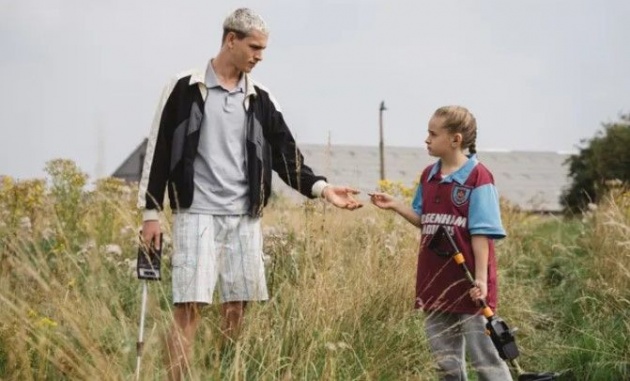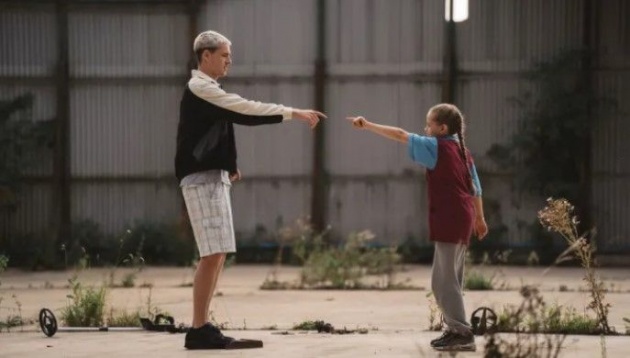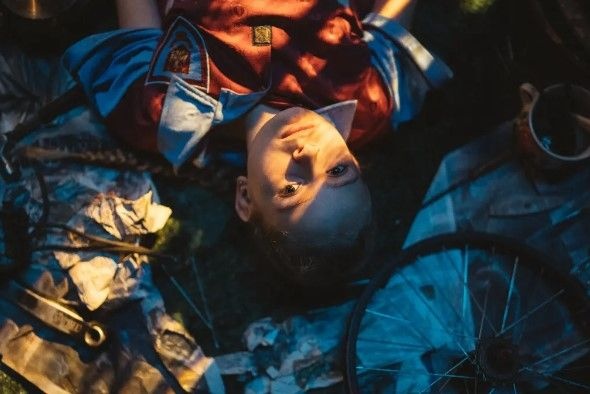
Pictured: 'Look what I found.' Jason (Harris Dickinson) presents his daughter Georgie (Lola Campbell) with his discovery in the British comedy drama, 'Scrapper', written and directed by Charlotte Regan. Still courtesy of Picturehouse Entertainment (UK) / Kino Lorber (US)
The penultimate film of this series is low-budget indie, Scrapper, a British, nay, London film written and directed by Charlotte Regan. Regan has directed a bunch of short films, some of which have been screened internationally, helmed pop and corporate videos and has absolutely earned the right to succeed.
I have mixed feelings about the end result. I enjoyed it very much, but it veers close to the aesthetic of British – specifically BBC – children’s television. If Regan sought a career directing episodes of Byker Grove or The Story of Tracy Beaker this would not be a bad thing, but my suspicion is that she has ambitions above tea-time in front of the kiddies.
Regan deals with a difficult topic – loss. Specifically the loss of one’s mother as experienced by a pre-teenage girl, Georgie (newcomer Lola Campbell). The effect is disorientating, numbing and world collapsing. Regan approaches the subject with good - I would qualify, excellent - humour. Georgie decides to manage ‘on her own, thanks’ – her riposte to the quotation ‘it takes a village to raise a child’ - stealing bikes and getting the local shopkeeper to pretend to be her uncle by recording phone messages. (Punchline not spoilt.) Georgie clings to her mobile phone because it has her final connection to her mother. She uses photographs of the sofa to arrange the cushions just so. There is also a locked room in which Georgie periodically slips. Did I say the film also features cutaways to talking insects, whose lines appear tickertape-style out of their mouths? I admit I haven’t seen that on Grange Hill.
Georgie has a best friend, Ali (Alin Uzun) who hangs out with her and knows about her bicycle thievery. One day, when Georgie is dubbing over a tele-shopping channel and Ali is pretending to be a caller, a stranger, Jason (Harris Dickinson) climbs over the garden fence to let himself in. We assume he tried the front door approach but was ignored; anyway, it is a great introduction. Jason explains that he is Georgie’s Dad. But where was he when Georgie was growing up? The partial answer was abroad selling club tickets.
Georgie’s immediate response is to send Jason out for a Chinese takeaway and lock the door. However, Jason is persistent and complains that Georgie is ungrateful. Ali makes himself scarce. The remainder of the film is, as they say, a journey of acceptance as well as the reveal of the secret of the locked room.
Regan introduces one other stylistic device – characters talking to camera. Specifically, girls who won’t befriend Georgie because, as one of them puts it, she doesn’t know how to apply foundation, as well as Georgie’s teacher (Cary Crankson), who complains that the child only needed half a day off to grieve her mum, and Georgie’s social worker.
Regan has an ambivalent attitude towards social realism – it dampens the mood. She wanted to make a film about working class people that is joyous and funny. The result relies on the chemistry between Dickinson and Campbell, which happily is excellent. Jason might seem like the caricature feckless absent dad trying to make things better, but he’s not quite a failure and has some street smarts. Campbell understands that Georgie is protecting her mother’s legacy, whatever that means, but is experiencing feelings that she doesn’t know how to process. Even though Regan is employing the idiom of children’s television, we sense that there is an adult behind the camera, one who is protective of her protagonist.
When Georgie is riled by another girl her age, she lashes out, and the film suggests the anger at the heart of Georgie’s grief - an anger that makes her exceptional. She rightly thinks no one around her can understand. The problem with teachers and social workers is that they treat children as children. Georgie wears a hearing aid, but it is never commented upon. It may also be a device through which Regan sends Campbell nudges to help her improvise, for example, Georgie telling a cyclist who catches her in the act that her bike has failed its ‘road safety’. The cyclist, a caricature, takes her seriously.
Campbell’s improvisation is written into the film, notably when Georgie and Jason are waiting for a train and parody the imagined conversation of a middle-class couple on the platform opposite. ‘We can hear you, you know,’ responds the man, as ‘Patrick’ (Jason) complains about the prolificate spending of his partner, ‘Sandra’ (Georgie).
Jason tries to reach his daughter through play – and a Colin the Caterpillar birthday cake - but ultimately only a genuine explanation will do, reconnecting Georgie to her mother. For father and daughter to have a meaningful relationship, Jason has to feel wanted, not as a substitute for Georgie’s mother, but in his own right.

Pictured: Forget looking for scrap, let's dance. Jason (Harris Dickinson) and Georgie (Lola Campbell) in a scene from 'Scrapper', a father-daughter comedy-drama written and directed by Charlotte Regan. Still courtesy of Picturehouse Entertainment (UK) / Kino Lorber (US)
While the idiom of the film may be children’s television, there are moments when it comes close to realism, notably Jason’s attempt to bond with Ali, burning the garlic bread and meeting Ali’s mother. Jason knows that he can take control of Georgie’s conversations with social services and provide adult reassurance.
Throughout the film Georgie wears a West Ham United football shirt that her mother gave to her – Jason tells her that it was once his. Football only features briefly; it is not one of Georgie’s core interests.
Lest Georgie become insufferable, there are moments when she elicits sympathy, when she asks a woman who buys Georgie’s stolen bikes, if she can help. The woman rightly refuses. Georgie reaches out for a new normal but won’t have one imposed upon her.
Regan achieves her aim of making a warm-hearted tale about working class people who never lose touch with their roots. The film’s least successful element is the locked room reveal. I understood what Georgie was trying to create, but it seemed somewhat outside the world of the film.
Modestly successful at the box office, grossing $650,000 on UK first release, Scrapper confirms the promise of Regan’s earlier work, arriving at an aesthetic that satisfyingly blends adult concerns with daft humour. Regan may have arrived at a career crossroads, whether to keep things light, or explore darker subjects. Her cinematographer, Molly Manning Walker, followed working with Regan with her feature directorial debut, How To Have Sex. However, there’s no shame in being daft. Sometimes the world calls for it.

Pictured: Staring up at her creation, Georgie (Lola Campbell) in a scene from the British film, 'Scrapper', written and directed by Charlotte Regan. Still courtesy of Picturehouse Entertainment (UK) / Kino Lorber (US)
Reviewed at Sundance London, Picturehouse Central Screen Five, Wednesday 6 July 2023, 11:30am, Press Screening



